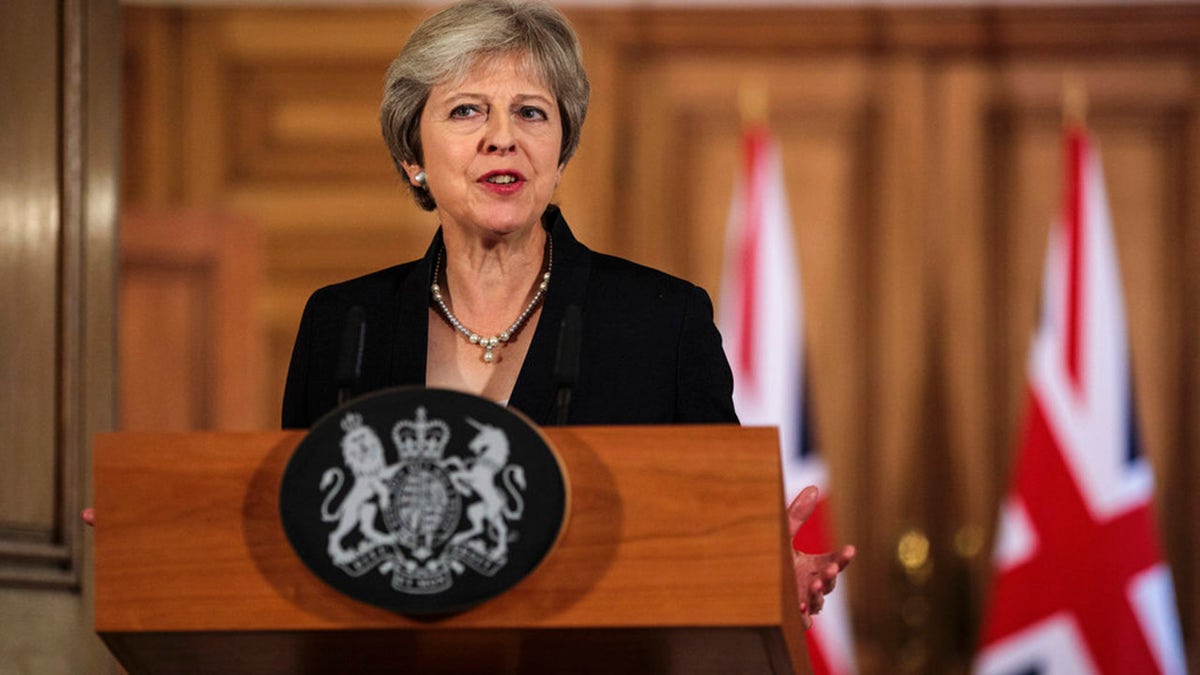
Prime Minister Theresa May warned the EU that she will not overturn Britain's 2016 decision to leave the bloc. (AP)
U.K. Prime Minister Theresa May on Friday warned that she would not overturn the Brexit referendum, a day after she was dealt a serious political blow when her compromise proposals were dismissed out of hand by E.U. leaders at a summit in Austria.
“The referendum was the largest democratic exercise in our country’s history,” she said in a stern statement from 10 Downing Street. “To deny its legitimacy or frustrate its result threatens public trust in our democracy.”
May’s statement came a day after E.U. leaders in Salzburg rejected her compromise Brexit plan, known as the Chequers deal -- named after May’s country residence where it was hashed out with her Cabinet in July.
The Chequers deal was an effort to find a middle ground between a looser free-trade "Canada-style" deal favored by Brexiteers, and a "Norway-style" deal whereby the U.K. would leave the bloc but remain in the E.U.’s single market, which allows for the tariff-free movement of goods, services and people.
The latter has been opposed by the right wing of the Conservative Party, who say such a deal would not be a real departure from the E.U., and in particular would not allow the U.K. to control its own borders. Immigration was a central issue of the debate surrounding the 2016 vote.
May's proposal would have allowed Britain to pursue free trade deals with other countries, while signing up for a common rule book with the E.U. for goods, but not services. It would have also avoided the prospect of a hard border between Ireland and Northern Ireland.
But E.U. Council President Donald Tusk dismissed the Chequers deal out of hand on Thursday.
“Everybody shared the view while there are positive elements in the Chequers proposal, the suggested framework for economic cooperation will not work, not least because it risks undermining the single market,” he said.
LONDON MAYOR CALLS FOR SECOND REFERENDUM ON BREXIT, SAYS NEGOTIATIONS ARE 'MIRED IN CONFUSION'
The flat rejection increased the possibility of "no deal" when Britain leaves the E.U. in March.
In her speech on Friday, May said that a deal whereby Britain stays in the European Economic Area and a customs union would “mean we’d still have to abide by all the EU rules, uncontrolled immigration from the EU would continue and we couldn’t do the trade deals we want with other countries.”
“That would make a mockery of the referendum we had two years ago,” she said.
She also said a free-trade agreement would mean a customs border between Northern Ireland and the rest of the U.K. -- something the British government has said is unacceptable.
“No one wants a good deal more than me,” she said, as she called for engagement from the bloc's leaders. “But the E.U. should be clear: I will not overturn the result of the referendum. Nor will I break up my country.”
May's harder stance comes after she has faced criticism from members of her own party for being too soft in negotiations, and faced witheringly critical headlines from the British press for her defeat in Salzburg.
Some Brexiteers, often critical of May, rallied to May's side at least for now, and said they were appalled at how May was treated, calling for her to back off from negotiations and prepare for a no-deal.
“Enough is enough, time to tell the arrogant, unelected EU bullies where to go,” former U.K. Independence Party Leader and Fox News contributor Nigel Farage tweeted. “No British Prime Minister should be treated like this.”
IN UK, TRUMP THROWS FUEL ONTO BRITAIN'S FIERY POLITICAL DEBATE OVER BREXIT
Top Tory Brexiteer Jacob-Rees Mogg MP said that the E.U. is “not acting in good faith” and said May was right to remind them that no deal is better than a bad deal.”
“It is time for the government to start putting forward as its plan a Canada-style free trade agreement for the whole of the U.K. This is the most realistic approach and similar to the E.U.’s approach,” he said in a statement, according to the Times of London.
Nicola Sturgeon, the Scottish first minister and leader of the left-wing Scottish National Party, described May's statement as "dreadful."
"The E.U. view was bluntly expressed yesterday but not new -- she just hasn’t been listening," she said. "If her tactic now is to double down on the Chequers dead duck, and then blame EU for a no deal, she will do huge damage to all those she is supposed to serve."
The harsh pushback from the E.U. puts May in even murkier political waters domestically and raise the prospect that she may face a coup from members of her own party. Foreign Secretary Boris Johnson resigned in July over the Chequers deal, saying that Britain was "headed for the status of a colony" with its current outlook on Brexit, and suggested that May was surrendering to the E.U. in negotiations.
May will face her own party at its national conference in Birmingham later in October, where she will make the case to fellow MPs that her approach to Brexit is the right one.








































